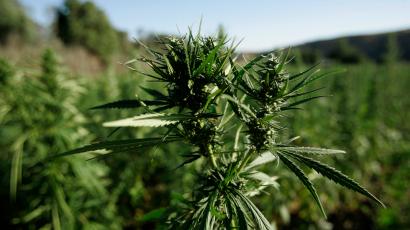
Lesotho cashing in on medical marijuana boom

Lesotho is aiming to make money from the booming medicinal marijuana industry, but the southern African nation already has an unheralded illicit trade in the drug for recreational use.
Green dust swirls around Mampho Thulo as she uses her hands to scoop dried marijuana leaves from a massive heap on the floor of her home into a big linen bag.
She has been cultivating the prized crop in her scenic village of Mapoteng for as long as she can remember.
Seventy kilometers (43 miles) north-east of the capital, Maseru, her land lies in a lush valley surrounded by the mountains that the country is well known for.
It is in this breath-taking scenery that people have been illicitly growing marijuana for recreational use for decades.
The high altitude combined with fertile soils, untainted by pesticides, enables growers to produce a high-quality crop, valued all over the world.
Closer to the capital, ranks of workers operate in more laboratory-like conditions in greenhouses to produce legal medicinal marijuana, as the country tries to cash in on its booming demand.
Last year, Lesotho became the first African country to legalize the cultivation of marijuana for medicinal purposes, spawning a new sector in a country where the economy struggles to create employment opportunities.
But these two worlds are unlikely to meet, as the small-scale farmer cannot afford the infrastructure and licensing costs that the legal trade requires.
Nevertheless, for Ms. Thulo, who has five children, marijuana is a valuable cash crop.
“This is how we earn a living… [as] the few jobs that are available are for educated people. So we rely on marijuana because we don’t have an education,” she told the BBC.
Despite the lifting of the restriction on growing medicinal marijuana, what Ms. Thulo does – growing it for recreational drug use – is still illegal.
The threat of arrest does not deter the 48-year-old.
“Yes I know it’s illegal to plant marijuana,” she concedes.
But with a note of defiance in her voice she adds, “My children are in school because of marijuana. When I sell some, I’m then able to pay school fees.”
The new medicinal marijuana industry is set to dwarf the money that the illicit small-scale farmers earn.
Globally, medicinal marijuana is big business.
The market for legal marijuana is set to be worth $146bn (£114bn) a year by 2025 with medicinal marijuana set to make up more than two-thirds of that, according to consultants Grand View Research.
As the first mover on the continent, Lesotho aims to capitalize on its green bounty by encouraging international investment not only in cultivation but also processing.
“We want to export finished products. So the plan is to cultivate and manufacture pharmaceutical products, nutritional products, cosmetics, and extraction of active pharmaceutical ingredients,” says Masello Sello, legal adviser at the health ministry, the department responsible for issuing licenses.
Lesotho’s entry into the medicinal marijuana market has encouraged other countries to get involved. Zimbabwe has also legalized its cultivation and a number of other African governments are considering it as well.
This year, the Toronto-based Supreme Cannabis Company invested $10m into Medigrow Lesotho, giving it a 10% share of the business.
For the time being Ms. Thulo will continue growing her illicit crop and she does not know anything about the medicinal business.
“This is all I know,” she chuckles as she finishes packing her giant bag of marijuana.
“There’s no other way I could earn a living.”






